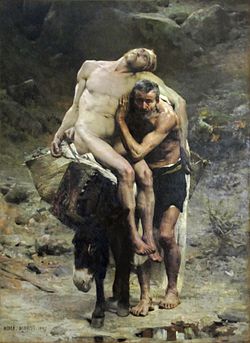 1. Virtue theory
1. Virtue theory
Virtue theory is largely based on Aristotle’s Nicomachean Ethics and as a result is sometimes known as neo-Aristotelianism. Unlike Kantians and utilitarians, who typically concentrate on the rightness or wrongness of particular actions, virtue theorists focus on character and are interested in the individual’s life as a whole. The central question for virtue theorists is “How should I live?” The answer they give to this question is: cultivate the virtues. It is only by cultivating the virtues that they will flourish as a human being.
1.1. Flourishing
According to Aristotle, everyone wants to flourish. The Greek word he used for flourishing was eudaimonia. This is sometimes translated as “happiness”, but this translation can be confusing since Aristotle believed that you could experience, for instance, great physical pleasure, without achieving eudaimonia. Eudaimonia applies to a whole life, not just to particular states you might find yourself in from hour to hour. Perhaps “true happiness” would be a better translation; but this makes it sound as if eudaimonia were a blissful state at which you arrive, rather than a way of living your life successfully. Aristotle believed that certain ways of living promote flourishing, just as certain ways of caring for a cherry tree will lead it to grow, blossom, and fruit.
1.2. The virtues
Aristotle claimed that cultivating the virtues is the way to flourish as a human being. But what is a virtue? It is a pattern of behaviour and feeling: a tendency to act, desire, and feel in particular ways in appropriate situations. Unlike Kant, Aristotle thought that experiencing appropriate emotions was central to the art of leading a good life. A virtue isn’t an unthinking habit, but rather involves an intelligent judgement about the appropriate response to the situation you are in.
Someone who has the virtue of being generous would, in appropriate situations, feel and act in a generous way. This would involve the judgement that the situation and response were of an appropriate kind. If put in the situation of the good Samaritan, a virtuous person would both feel compassion for the man left by the roadside, and act in a charitable way towards him. A Samaritan who only helped the victim because he had calculated some future benefit for himself would not be acting virtuously, since generosity involves giving without thought of benefit to yourself.
If the Samaritan had arrived at the time the robbers were attacking their unfortunate victim, and the Samaritan had had the virtue of courage, then he would have overcome any fear and confronted the robbers. Part of what being courageous means is having the ability to overcome fear.
Virtues such as generosity and courage are, virtue theorists believe, virtues which any human being will need in order to live well. This might sound as if a virtuous individual could pick and choose from a portfolio of virtues those which he or she wanted to develop, or as if someone who possessed a single virtue to a great degree could be a virtuous person. However, this would be a misunderstanding. For Aristotle, the virtuous person is someone who has harmonised all the virtues: they must be woven into the fabric of the virtuous person’s life.
2. Criticism of virtue theory
2.1. Which virtues should we adopt?
A major difficulty with virtue theory is establishing which pattern of behaviour, desire, and feeling are to account as virtues. The virtue theorist’s answer is: those which a human needs to flourish. But this doesn’t really give much help. Virtue theorists often produce lists of virtues such as benevolence, honesty, courage, generosity and loyalty, and so on. They also analyse these in some detail. But, as there is not complete overlap between their lists, there is room for debate about what should be included. and it is not always clear on what grounds something gets designated a virtue. .
The danger is that virtue theorists simply redefine their prejudices and preferred ways of life as virtues, and the activity they dislike as vices. Someone who likes fine food and wine might declare that subtle stimulation of the taste buds is as essential part of living well as a human being, and thus that being a lover of fine food and wine is a virtue. A monogamist might declare fidelity to one sexual partner a virtue; a sexually promiscuous virtue theorist might make a case for the virtue of sexual independence. What is more, if the virtue theorist opts for accepting only those ways of behaving, desiring, and feeling which are typically considered virtuous in that particular society, then the theory emerges as an essentially conservative one, with little scope for changing that society on moral grounds.
2.2. Human nature
A further criticism of virtue theory is that is presupposes that there is such a thing as human nature and so that there are some general patterns of behaviour and feeling appropriate for all human beings. However, such a view has been challenged by many philosophers, who believe that it is a serious mistake to assume that human nature exists.
Source: Philosophy: The Basics, by Nigel Warburton